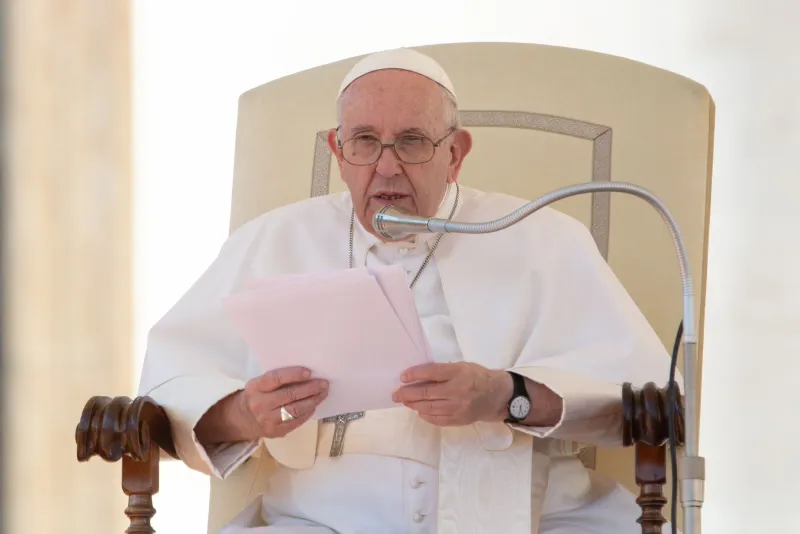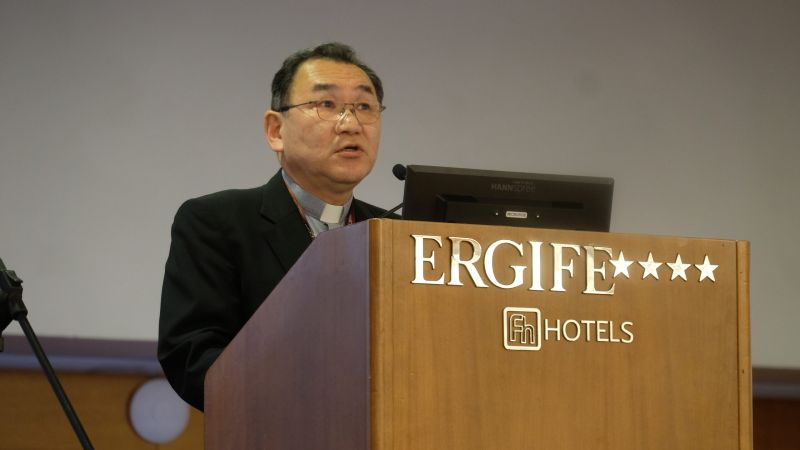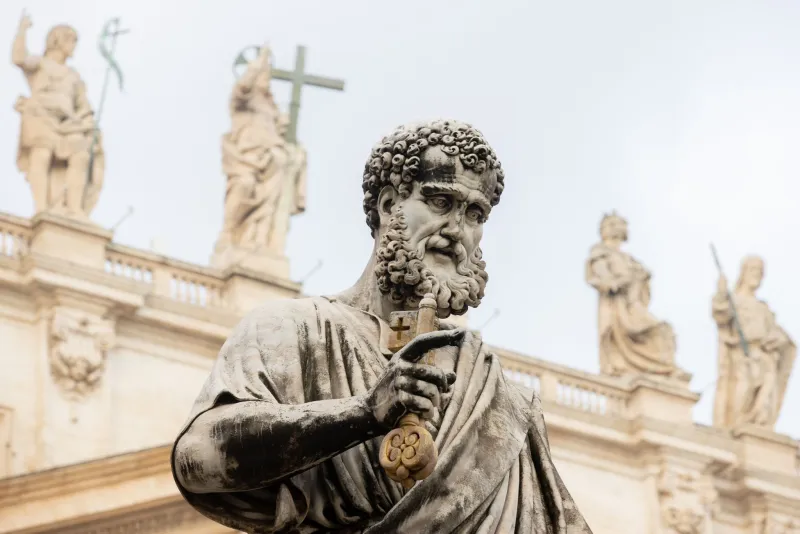 Pope Francis speaks in St. Peter’s Square Oct. 15, 2022. / Daniel Ibanez/CNA
Pope Francis speaks in St. Peter’s Square Oct. 15, 2022. / Daniel Ibanez/CNA
Rome Newsroom, Nov 22, 2022 / 12:30 pm (CNA).
Why did Pope Francis dismiss the entire leadership of the Church’s worldwide charity arm Tuesday?
What role will Pier Francesco Pinelli play as temporary administrator of Caritas Internationalis, appointed by papal decree on Nov. 22?
A key date to understanding the move and how it aligns with the pope’s broader reforms is Oct. 15, 2022.
On that day, Pope Francis received in audience at the Vatican Father Giacomo Canobbio and delegates of Bain Capital. The financial investment firm is where Pinelli previously worked. And Canobbio is the priest who, without announcement, was appointed by Pope Francis to the role of commissioner of the Pontifical Lateran University.
Both appointments are typical for the pontiff and his preferred modus operandi: Pope Francis sends an inspection or appoints a commissioner whenever he wants to reform something.
The papacy of commissioners
There were no apparent reasons for appointing a commissioner to Caritas Internationalis — just as there were no apparent reasons for appointing a commissioner at the Pontifical Lateran University.
However, Pope Francis has previously ordered a number of inspections.
Bishop Claudio Maniago was made the inspector of the Congregation for Divine Worship and the Discipline of the Sacraments, after which the pope appointed Archbishop Arthur Roche as prefect of the dicastery. Next, Bishop Egidio Miragoli inspected the Congregation of the Clergy, which was still in progress when the pope appointed the Korean bishop Lazzaro You Heung-sik — later created cardinal— as prefect of the dicastery.
At the beginning of his pontificate, Pope Francis appointed several commissions.
One such body was the commission of reference on the administrative-economic structures of the Holy See, known by its Italian acronym COSEA. Another was CRIOR, the commission for studying the Institute of Works of Religion reform, commonly known as the Vatican Bank.
Their work, once completed, resulted in the extensive overhaul of the Vatican’s financial departments and the new Institute of Works of Religion statutes, promulgated in 2019.
However, the appointment of a commissioner in Caritas Internationalis has another clear precedent: the inspection of the Dicastery for the Promotion of Integral Human Development.
The inspection took place in July 2021 and was led by Cardinal Blase Cupich, the archbishop of Chicago. The team also included Sister Helen Alford, vice-rector of the Pontifical Angelicum University, an ordinary member of the Pontifical Academy of Social Sciences; and Pinelli, the new administrator of Caritas Internationalis.
Pinelli’s profile
A trained engineer and experienced manager, Pinelli has worked with several institutions as well as a consultant for management and investment firms.
According to Vatican rumors not officially confirmed but provided to CNA from multiple sources, Pinelli was also involved in restructuring what is now the Dicastery for Integral Human Development.
A press release from the dicastery said Pinelli was an engineer “with a more humanist than technical way of proceeding” and that he was “formed in Ignatian spirituality,” a man who “from an early age was active as a volunteer working with recovering drugs addicts, in development cooperation, support for missionary works, and catechesis.” The statement also noted that he is married with three children and three grandchildren.
The release also emphasized that “in 33 years of work,” Pinelli had gained managerial experience in different sectors, including a large energy company.
Having worked both as a project manager for energy companies and as a management consultant for Bain, Pinelli also has experience working with religious and secular works and institutions, according to the release.
Obviously, his formation and positions in some Jesuit institutions may have played a role. It seems likely that Cardinal Michael Czerny, SJ, the current prefect of the dicastery, had a word in involving him and others.
However, it is still hard to assess which issues are at stake. It seems clear that the pope wants to reform Caritas Internationalis, including its statutes and bylaws.
Founded in 1951, the Catholic confederation is made up of 162 charitable organizations based in 200 countries around the world. Its headquarters are located on Vatican territory in Rome, and the Vatican oversees its activity.
According to Czerny’s dicastery, “no evidence emerged of financial mismanagement or sexual impropriety”; however, “deficiencies were noted in management and procedures, seriously prejudicing team spirit and staff morale.”
Pinelli’s task
The reform of the statutes will be the first task of the new commissioner.
Pinelli will be assisted by Maria Amparo Alonso Escobar, Caritas Internationalis’ head of advocacy, and by Jesuit Father Manuel Morujão, who will provide personal and spiritual accompaniment to Caritas employees, according to Pope Francis’ decree.
In May 2023, the next Caritas Internationalis general assembly is expected to be held in Rome, with the appointment of the new president, general secretary, and treasurer. By then, the reform process will likely be completed.
Caritas Internationalis will undergo a review “in order to improve its management norms and procedures — even while financial matters have been well-handled and fundraising goals regularly achieved — and so better to serve its member charitable organizations around the world.”
However, a reform of the statutes already took place in 2019 and was approved by the pope with a rescript of Jan. 13, 2020.
As for the change of the statutes of Caritas Internationalis, it was simply a matter of passing the competencies from the Pontifical Council Cor Unum, which no longer exists, to the Dicastery for the Promotion of Integral Human Development, which has absorbed its functions.
As for the rules of procedure, these changes were not communicated. But they generally accepted some of the requests approved by the Caritas General Assembly, which envisaged encouraging the presence of women within the highest representative bodies and including two young people in the same representative bodies.
In particular, there was talk of the Representative Council of the federation, abbreviated with the name RE.CO., the acronym for Representative Council. These indications have now been implemented and will become operational.
The structure of Caritas Internationalis was thus “adjusted” and adapted to the reform of the Curia.
However, the statutes of Caritas Internationalis remained confirmed in the structure as Pope Benedict XVI reformed them in 2012. Those statutes strengthened the collaboration between Caritas Internationalis and the Holy See and clearly outlined the competencies of the Vatican Secretariat of State.
Not only that: the new structure of Caritas Internationalis gave greater coordination to departments and bodies connected to the Holy See, which also concerned doctrinal aspects.
The rationale behind Benedict XVI’s reform
It is noteworthy that the 2012 reform was part of a more extensive project by Benedict XVI to accomplish Pastor Bonus’s provisions fully.
Pastor Bonus was the apostolic constitution that regulated the functions and tasks of the Curia offices, and Praedicate Evangelium now replaces that.
However, the reform came after a governance crisis. In 2011, the Secretariat of State did not approve the renomination of the former secretary general, Lesley-Anne Knight. (However, her work was praised by the president of Caritas Internationalis at the time, Cardinal Oscar Andrés Rodriguez Maradiaga.) As a result, she was replaced by Michel Roy, a Frenchman who worked with Secours Catholique — the Caritas in France.
Knight’s non-confirmation also stemmed from the new approach given with the subsequent reform of Caritas Internationalis.
It was an approach that derived from the formulation of Benedict XVI’s encyclical Caritas in Veritate. In the encyclical, Benedict XVI stressed that human development and foreign aid could not be separated from the demand for truth. The encyclical also pointed to the fact that many international organizations were promoting abortion, contraception, sterilization, and euthanasia.
This was an approach that Knight did not fully share, as she publicly explained to the media at the time.
While some approved of Knight’s departure, others were disappointed. Despite a robust generational change in Caritas Internationalis in recent years, these divisive feelings may have lingered in the background and fueled some complaints about “management and procedures.”
What will the new reform look like?
The tone of the dicastery’s press release suggests that the reform will be more managerial. But, above all, it is a substantial change in philosophy from the reform of Benedict XVI.
In short, it could be another paradigm shift by Pope Francis, comparable to some degree to his restrictions of the Traditional Latin Mass.
From this point of view, Pope Francis has identified several people to help complete his changes to the Church’s structure.
In carrying out the reform, the pope does not hesitate to demote someone like Cardinal Luis Antonio Tagle, current president of Caritas, who now finds himself mandated to “liaise” with Pinelli and his staff for the upcoming general assembly.
Tagle was rumored to be appointed the next prefect of the Dicastery of Bishops. Even if these rumors were to be confirmed, Tagle’s public image has now been compromised by the Caritas decision. This will also weigh in a future conclave.
Pope Francis, however, is completing his goals. As he said in one of his homilies in the days of the COVID-19 lockdown of 2020 — and also in a meeting with the Candia Foundation in April — he remains critical of humanitarian organizations that do good work but spend 60% of their budget on wages. The pope called on them to keep costs to a minimum, “so that most of the money goes to the people.”
[…]





